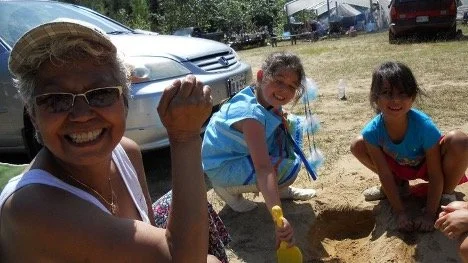Drums and Hearts
Boozhoo! Dancing Sky Woman indigoo, Aurora indizhinikaaz. Makwa indoodem. Indoonjii Netmizaaggamig Nishnaabeg.
Hello! I am called Dancing Sky Woman and my name is Aurora. My clan is bear. I am from Netmizaaggamig Nishnaabeg (formerly known as Pic Mobert First Nation).
Many of my earliest memories take place at my reserve's annual pow wow where much of my grandma’s side of the family gather for the August long weekend. Aunts, uncles, and cousins come from across Ontario with their kids and their tents. For this single weekend, what for most of the year is an empty clearing in the woods, becomes a giant family reunion. A pot of tea is always boiling on the fire, Granny is making feast-worthy amounts of Bannock, and the kids are getting ready to go swim in the lake with the eldest cousin on lifeguard duty. Life is good.
If you could just put yourself in my shoes for a second, the process begins with visiting an elder. Through traditional offerings of tobacco and other Indigenous medicines, you can get your spirit name, clan and colours. Then, you’ll spend weeks looking for the perfect fabrics and ribbons for your regalia. In my last set, I incorporated all eight beautiful jewel tones that were given to me in my yolk, skirt and shawl. You’ll have to go through the pain of getting your hair tightly braided with pinned in eagle feathers and giant beaded clips. Before you go, you’ll put on your dancing shoes like moccasins, or in my case deer hide wrap boots. Finally, it’s time to dance.
I was never the best dancer, having only learnt by observation, but I always tried my hardest. I had never felt safer, twirling around with my cousins while the community watched. But as I grew up, my confidence diminished much like what happens to most adolescent girls. Even when I stopped dancing, I would still spend my days in the stands watching and listening as my people displayed our culture in the most engaging ways.
The last time I went to the pow wow was in 2017. I never realized how much I missed it until I watched my brother’s grade eight graduation. His school brought in a man to sing and play the hand drum at the ceremony. It immediately brought tears to my eyes, as well as my grandmothers, and I was transported back to impatiently waiting in line at the grand entrance ceremony. I don't know more than five words in Ojibwe but that never made a difference. Since I grew up with the song and dance being such an important aspect of my culture, the familiar sound evokes my strongest emotions. It's difficult to put into words how much this music means to me as I’m sure it would be for anyone who has something that feels like an extension of themselves.
When I was around seven or eight years old, my grandparents were taking me on a road trip to Toronto. On the way, we stopped at a small craft shop where my grandma had bought me a CD titled “New Moon Medicine” by Ode’min Kwe Singers. It contained thirteen traditional Anishinaabe pow wow songs, sung and hand drummed by two sisters from Toronto. When I returned from the trip it was added to my daily rotation of Kidz Bop and Selena Gomez that my pink CD player had worn out.
Instrumentally, pow wow songs are quite simple. There’s usually a group of four or more people who will play the drum with the occasional shaker added in. To me, it’s the vocals that add the heart and soul to the songs. The lead singer will start before the rest of the group begin to sing in unison. They will repeat a verse four or more times, depending on what feels right in the moment, before moving onto the chorus which is also sung four times. Often, adlibs will be included throughout the song to keep the energy high. When the tempo increases, you know you are nearing the end of the song. The dance always ends on the final beat of the drum. Though, if a dancer whistles or raises his staff towards the drum circle, it will continue for a few more rounds. There are many different types of songs played throughout the ceremony depending on the specific styles of dance such as fancy or grass, healing songs danced by those in jingle dresses, and intertribal songs where the audience is invited to join in. On the final day of the pow wow, the ceremony closes out with Grand Exit where the elders and the head dancer exit the circle last.
I don’t have enough knowledge to speak on music from other tribes, let alone enough to speak on my own, but I would encourage everyone to take some time to listen to a few songs or watch a dance performed by Indigenous peoples. Remember to keep an open mind and understand that these songs and traditions have been passed along by elders for many generations and are incredibly sacred to many. Nonetheless, they are made to be heard by all walks of life.
Images provided by the author.




